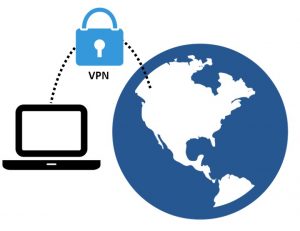What is a VPN?
A VPN is a popular method to provide users with more online security. VPN is an abbreviation of Virtual Private Network. A VPN helps you improve your online security by adding an additional layer of security to public and private networks.
The VPN works by allowing its users to send their data through an encrypted secure connection to an external VPN server.
From that VPN server, it will be sent to the designated server on the internet. As it normally would without a VPN server.
This can be used to browse online in complete privacy, but also to gain access to online content that you otherwise might not have been able to watch. (For example, BBC iPlayer or unblocking the locked TV stations live stream of a certain country).
A VPN provides users the following 3 essentials:
1. Security
As a VPN encrypts the connection, the data cannot be intercepted by unknown third parties like hackers or governments.
2. Anonymity
A VPN also hides your IP address, as a VPN provider allows you to make use of their servers all over the world. Your IP address is the personal internet identification number of your internet connection. As a VPN user you will use the IP of the VPN server, this means that third parties cant trace your location and identity.
3. Freedom
As a VPN user, you are granted access to a worldwide network of VPN servers. By using the servers in a certain country, you can browse the web as if you live in that country. This feature allows you to get around online blockades, online censorship, restrictions on social media, and online streaming services limitations.
So VPN is a total security solution?
Well, not quite...
While all your traffic that is sent through the VPN connection is secure and encrypted, you will be secured when using the internet wherever you are. Do bear in mind that your devices are only as secure as the weakest link. So if your device is already infected with a virus, you could still be spied or hacked as the malware is already installed.
Hide your online history from your ISP or government
By using the VPN you will effectively deny your ISP (Internet Service Provider) or government from seeing your online history.
Location spoofing
VPN apps are also used quite a lot to spoof their location. This is done so that users can access overseas content or services.
Click here to read our unblocking tutorials
Protect yourself online!
Its 2018, hacking has never been easier. Right now most public transportations starting to offer free public WiFi services. You should know how easy I can hack your phone when you're on that public WiFi.
A few examples of what I can do when I'm on the same network as you are:
- Phishing
- Steal your passwords or accounts
- See and copy your local files
- See which site's you visit
- Change the site's you visit
- Block your WiFi signal
And the list goes on even further...
By using a VPN, I won't be able to hack you so easily anymore as your device will send all traffic encrypted and mostly rendering it useless for me.
Proxy or VPN?
Another popular privacy tool is a proxy. And while both technologies aim to hide a user's online identity, they do differ from VPN, as they only change the IP address between your PC and the web server. Thus not providing full online protection.
When using a VPN, you will encrypt your entire internet connection and change your IP address.
Interested in getting a VPN?
